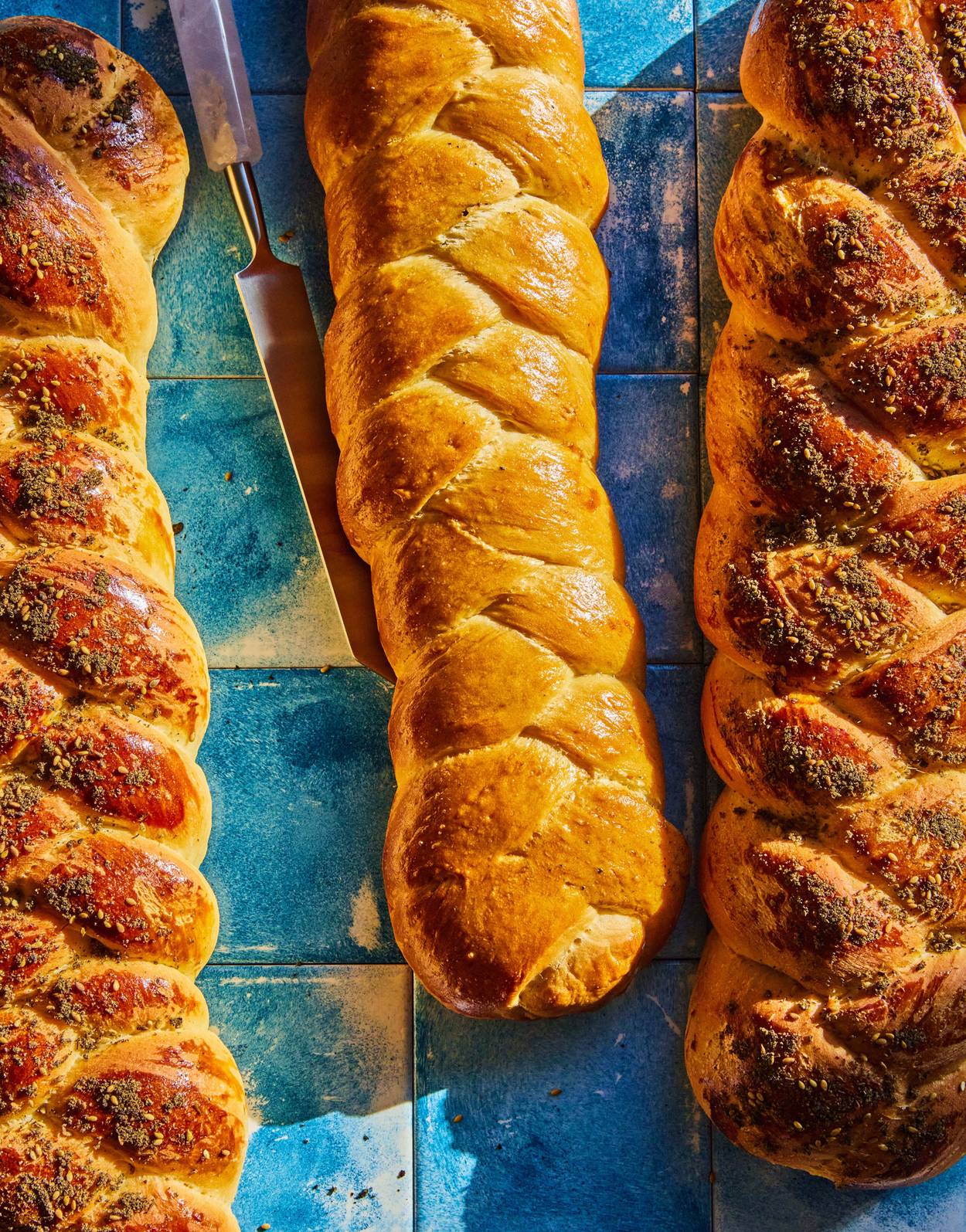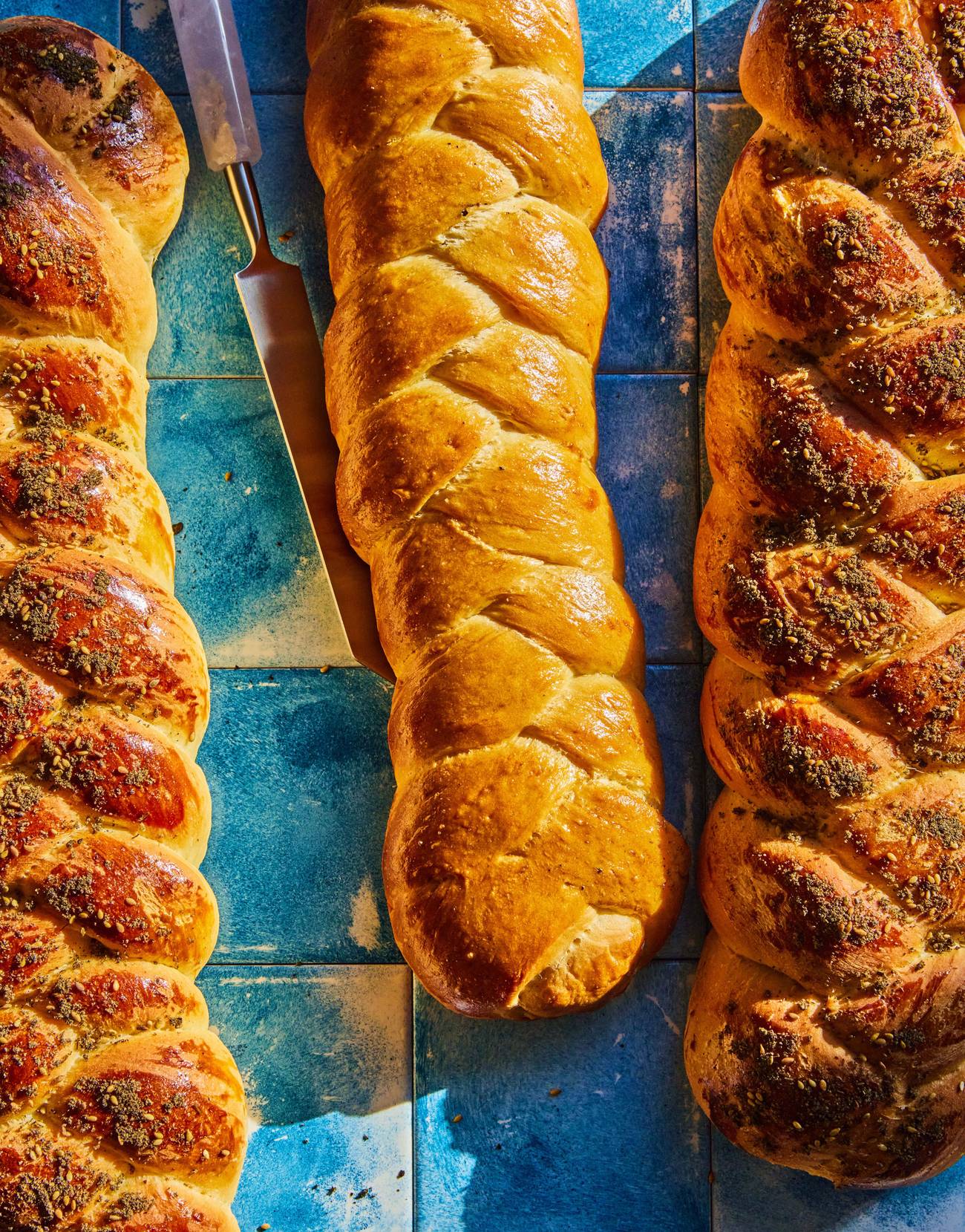Kitchen Therapy
In his new cookbook, ‘Mind Over Batter,’ Jack Hazan brings together self-care with recipes for everything from challah to sambusak




Growing up in the Syrian community in Brooklyn, Jack Hazan felt like an outlier in most situations. According to his family, he should have been attending a Jewish school, planning to get married and have children, and taking over the family business. Instead, labeled as hyperactive, he was bouncing from school to school, and figuring out that he was gay. After years of trying to discover who he really was and where he fit in, he eventually found his way in the kitchen. “I always found cooking and baking to be my creative outlet,” said Hazan. “It’s where I got my energy out. Some people would play basketball, some people would play in the park, but I would go to the kitchen and apply what I observed.”
Inspired by his aunt Dina, Hazan decided to pursue becoming a licensed therapist. During school, he started baking challah to help pay his bills (thanks to his aunt Brenda’s recipe). He attended a Shabbat dinner at the Kabbalah Center in New York, and brought some of his homemade challah so that he wouldn’t have to eat the store-bought challah being served. Much to his surprise, Madonna was at the same dinner, tasted his challah, and loved it. It was soon after that Hazan created his baking business, Jack Bakes.
Hazan’s challah business boomed, and he found himself torn between his schooling and his new side gig. It was one of his professors who helped him make the connection that baking is in fact a form of therapy. “Right around the time of my graduation is when I started thinking that I could really marry the two passions I had: baking and therapy,” he said.
The result is Mind Over Batter: 75 Recipes for Baking as Therapy, a new self-care cookbook Hazan wrote with his friend Michael Harari. Hazan dedicates the book to the women in his life who have inspired him to become his true self—even when that didn’t meet the expectations others had of him when he was growing up.
“Forget about the black sheep,” Hazan writes in the book. “I was the gold-plated (marzipan) duck.”
Seven years before working on the book together, Hazan met Harari through friends. Similar to Hazan, Harari grew up with the Syrian traditions and recipes through his father’s side of the family, but his mother is Ashkenazi, so there was quite a bit of variety in their family’s Jewish foods. Harari grew up in Long Island, outside of the main Syrian community where Hazan had lived, yet when they met they found they had much in common. “After Jack and I met, I consulted on his challah business, so we’ve always had creative endeavors between us,” said Harari. “We’ve had many moments of bonding throughout the years over our similar upbringings, and foods, and we had this idea for a cookbook and we just ran with it. It’s like a love letter to our cultures, our families and the food that we grew up with.” While Hazan is the main author, Harari collaborated on the structure and the imagery, as well as many of its recipes.
The COVID-19 pandemic made them really believe they could make the cookbook happen. When their friends started baking excessively, they understood that this book might be in a good position to be accepted by people. “People were stuck at home, and started baking, and they realized they felt so much better after they baked, but didn’t have tangible information as to why that was,” said Harari. “We wanted to help them think of the dough as a stress ball. Jack’s grandma Peggy used to say to him when they would bake challah together, ‘Put all of your energy into kneading the dough, because the dough can take it.’ So we want to help people make those connections.”
The cookbook doesn’t just include inspirational photos and recipes of beautiful baked goods, it provides meaningful content as well. The book is divided into sections such as self-care, finding comfort, and dealing with stress and anxiety. The introduction to each section is robust, full of personal stories from the authors, and tidbits of insights and advice that you might get if you sat down with Hazan in therapy. At the end of each introduction is a “Quick Session” where Hazan gives more concrete strategies and exercises in things like creating boundaries for yourself, and moving through the stages of grief. Sprinkled throughout are baking affirmations such as “I give myself permission to heal on my own terms and in a way that works for me.”
Hazan and Harari are very clear in calling out the intentions and boundaries within this book. Included in the “Notes From a Baking Therapist” introduction, Hazan writes: “There are some things that baking can’t fix that a licensed professional can help with. If you are in need, please find a therapist to speak to.”
While Mind Over Batter is not a Jewish cookbook, the authors infuse their Jewish background—specifically, their Sephardic culture and cuisine—into the writing and recipes. In the “Finding Comfort” section, Hazan expands the reader’s definition of Judaism to include more than religion, but traditions, family, and cooking. “Our memories are tied to experiences, smells, and flavors, so it’s no wonder that baking can be so comforting,” Hazan writes. “When we bake, we’re not just connecting to the memory of that experience or the person with whom we shared the food. Baking connects us back to our family history, religion, or culture; it’s a story of where we’ve come from, even when the narrator has passed.”
The authors made sure to include Jewish recipes that are more widely known, like mandel bread, challah, and bagels. But more specifically, they wanted to highlight Sephardic recipes that may be lesser known, like ka’ak, sambusak, and kanafeh. The book also provides Sephardic twists on baked mainstays like Syrian carrot cake, and Middle Eastern rice pudding.
Readers will notice that rose water is present in many recipes in Mind Over Batter, as many Syrian bakers use rose water instead of vanilla extract. “Rose water is Syrian baking’s holy water,” Hazan writes. “Grandma Peggy’s kanafeh, with its rose water scent, became synonymous with the sweetness of acceptance.”
Hazan and Harari hope this book helps readers who may be going through tough experiences. “I want to give people the opportunity to heal and make themselves feel better—when going to a therapist is not accessible, or affordable,” said Harari. “I want to point them to this thing that’s always available to us right in your kitchen, where you can grieve, where you can turn your kitchen into your own therapy office. I want to open people’s minds around mental health, and what mental healthcare can look like.”
Jamie Betesh Carter is a researcher, writer, and mother living in Brooklyn.